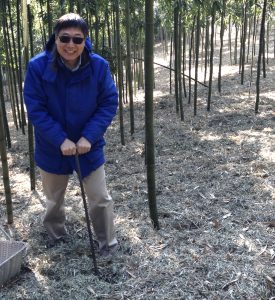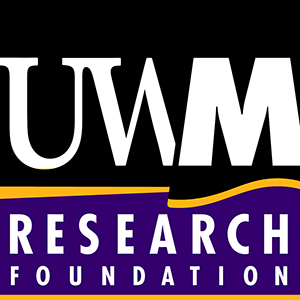A UWM Entrepreneur’s Personal Quest to Battle Antibiotic Overuse
Motivated by a family tragedy, UWM Professor Ching-Hong Yang developed a groundbreaking biopesticide and founded startup T3 BioScience to get it to market. In this interview, Dr. Yang shares his story.
by Jessica Silvaggi, PhD, President of UWMRF

UWM Professor Ching-Hong Yang, who is founder and CSO of T3 Bioscience
Dr. Yang, you’ve previously shared that your personal experience with your father’s battle against antibiotic-resistant infection inspired you to establish T3 BioScience. Can you elaborate on this experience and how it motivated the founding of your company?
CHY: My journey towards founding this company, T3 BioScience, is deeply personal and stems from an incredibly challenging time in my life. My father battled an infection that, tragically, was resistant to multiple antibiotics. He ultimately lost his fight against the infection. This experience was heartbreaking. It made me aware of the dire consequences of antibiotic resistance, a growing global health concern.
This personal tragedy ignited in me a passion to seek alternatives to traditional antibiotics, especially in the agricultural and food industries where their overuse is particularly prevalent. I realized the urgency of developing sustainable and effective solutions that do not contribute to the problem of antibiotic resistance. This became the driving force behind establishing my company.
Our mission is to revolutionize the approach to crop protection from diseases by offering safe and effective alternatives. This innovation aims to significantly reduce the reliance on antibiotics in agriculture. Every step I take in the company is a tribute to my father’s memory and a step towards a world where fewer families must face the kind of loss I did. We have named our first novel natural compound we developed for controlling multiple crop diseases ‘RejuAgro,’ as a tribute that incorporates my father’s name Reju, in honor of his memory.
Tell us more about the innovation. What is RejuAgro, and where did it come from?
CHY: Our journey began back in 2017 when we initiated a project to create the first extensive collection of microbes from the soil of various U.S. orchards and natural environments. Our goal was to uncover unique natural compounds, produced by microbes that could effectively control plant diseases.
Over the course of five years, we screened over 44,000 microbial isolates. It was during this comprehensive screening process that we identified the novel metabolite that became RejuAgro. The discovery of this powerful and versatile metabolite marked a significant milestone in our efforts to develop sustainable solutions for plant disease control.
Among the plant diseases you are targeting are citrus greening and citrus canker. I hear the citrus crops have been ravaged by these diseases. Are there any products that work against them now?
CHY: Regarding citrus greening, there is no cure, and the management strategies and effective products vary significantly. Management focuses primarily on prevention and mitigation. Clinical antibiotics like streptomycin and oxytetracycline are being explored as potential treatments. These antibiotics are thought to target the bacteria responsible for citrus greening, however, their effectiveness in the field is still a subject of research and debate. For citrus canker, the use of copper-based bactericides is more common, and some farmers use antibiotics.
Could your biopesticide product be considered a natural and organic type of crop protection?
CHY: RejuAgro can indeed be considered a natural and organic form of crop protection. It is derived from natural sources and is developed to align with the principles and regulations of organic farming. Our product is designed to control diseases without resorting to synthetic chemicals, making it a fitting choice for organic agriculture.
The active ingredients in our biopesticide come from soil microbes, naturally occurring substances. We focus on creating solutions that are not only effective in protecting crops but also safe for the environment, farmers, and consumers.
Does the United States have different rules compared to other countries in using antibiotics in crop protection? Does the USA have plans to ban antibiotic use?
CHY: The regulations surrounding the use of antibiotics in crop protection vary significantly between the United States and other countries. In the European Union and several other regions, the use of clinical antibiotics in agriculture is more tightly controlled or even banned, especially due to concerns about antibiotic resistance. The EU, for instance, has stringent regulations against the use of antibiotics for plant disease control, aligning with their overall approach to reduce antibiotic usage in agriculture and food.
As for the plans of the United States in this regard, there have been ongoing discussions and studies about the implications of antibiotic use in agriculture and its contribution to the global issue of antibiotic resistance. While there isn’t a clear, immediate plan to completely ban antibiotics in crop protection, there’s a growing movement, also driven by consumers, towards more sustainable and environmentally friendly practices. Research and development in alternative methods, such as biopesticides and biological control agents and improved agricultural practices, are gaining momentum.
How big is your team now?
CHY: The science team is a combination of five company employees and UWM collaborators. This includes myself as Chief Science Officer. Additionally, we have four graduate students who are dedicated to the fundamental research aspect of our project.
The science team is complemented with business expertise through our CEO, Daniel Burgin, and external science and industry advisors. This mix empowers us to blend practical industry experience with cutting-
edge academic research, broadening our scope and enhancing our capabilities to develop innovative solutions that are commercially attractive and viable to the agricultural industry.
Anything else we should know about T3 BioScience that we haven’t heard about?
CHY: Our passionate commitment, combined with scientific innovation in developing natural products as sustainable alternatives to conventional antibiotics for crop protection, is a key aspect of T3. It is important to understand that T3 is not a “one product shop”. RejuAgro is only the first product. It will be followed by more unique compounds that will transform the agriculture industry of crop protection.
For example, we are working on a product to control apple fire blight. Orchard testing has been consistently promising, showing effectiveness at levels comparable to traditional antibiotics. We plan to present our findings to the EPA as early as the second quarter of 2024. This represents a significant milestone in our quest to offer more natural solutions for crop protection. Additionally, our research and development efforts extend to other natural products, specifically targeting crop fungal diseases.
As a company initiated at UWM and the UWM Research Foundation, our focus is deeply rooted in innovative research and development. Our unique model allows technicians trained within our company to regularly advance to graduate studies. It not only enriches their academic and professional experience but also strengthens T3 BioScience’s ties with academic research. We strongly encourage and support this transition, as it aligns with our core values of fostering education and continuous learning. At T3 BioScience, we believe that this integration of industry and academia is vital for pushing the boundaries of what’s possible in commercially viable agricultural science and technology.
Dr. Jessica Silvaggi is the President of the UWM Research Foundation whose mission is to guide innovation, ignite startups, and foster partnerships with companies worldwide. Silvaggi joined the UWMRF in 2009 and has helped to grow the organization and build new programs to support UW-Milwaukee’s cutting-edge researchers and new entrepreneurs.


